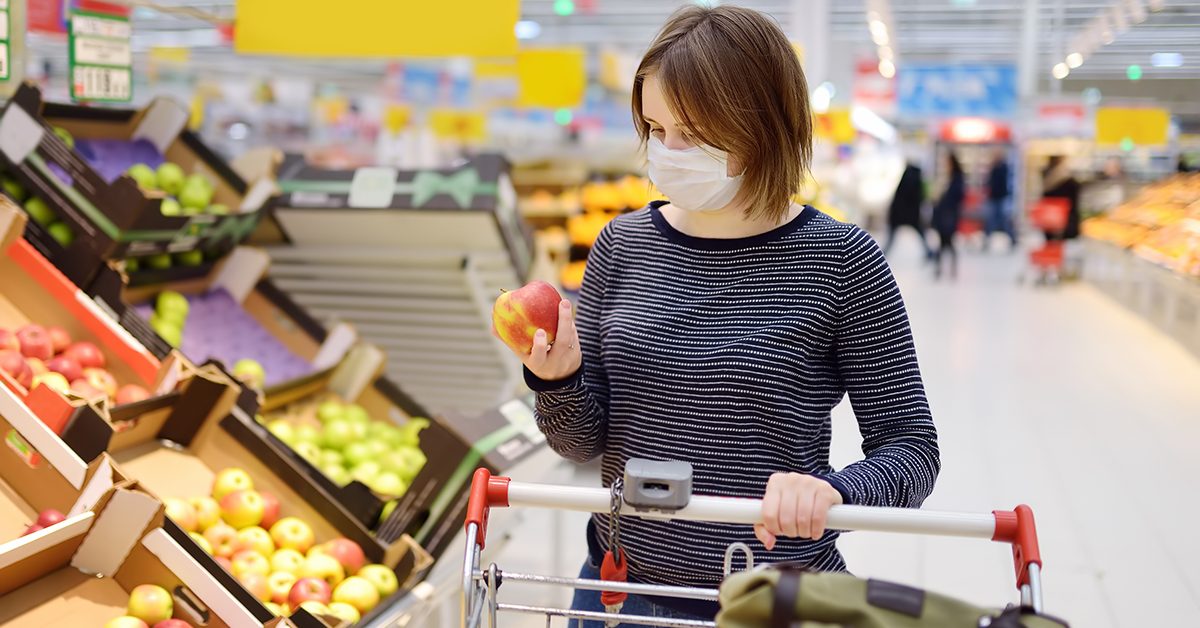How to Shop for Food Safely During the Coronavirus Pandemic

The Covid-19 pandemic has upended a lot of aspects in our daily lives, and this includes trips to the grocery store. Once an ordinary, mundane task has now become a nerve-wracking ordeal that brings forth many questions: Is it necessary to wear a mask? Is the virus on produce or food packaging?
The latest advisory from the Centers for Disease Control and Prevention specifically mentions pharmacies and groceries as public venues where it can be challenging to practice social distancing. Hence, it recommends that the public wear face coverings “to slow the spread of the virus and help people who may have the virus and do not know it from transmitting it to others.”
Some families are trying to avoid trips to the grocery stores by purchasing their groceries online. There are a number of ways you can limit your exposure to the virus and shop for food safely during this special time.
Before:
1. Consider if going to the grocery store is really necessary.
We are advised to stay home as much as possible, so if you only need a few items, it’s best to postpone your trip, get by with what you currently have, and plan a major trip to the store later.
2. Think about other options.
You may want to consider having your groceries delivered. If you want to take this route, it’s best to have the items delivered at your doorstep and consider giving your tip electronically.
3. Shop at off-peak hours
This can be as soon as the grocery store opens or an hour before it closes. Search for the store using Google search, and you will normally see a box showing when foot traffic in the establishment is the highest. Also, try to purchase as many items as you can from a single store.
During:
1. Sanitize your hands often.
Do this before entering the grocery store and as soon as you leave. If the establishment doesn’t provide disinfecting wipes, have them handy to use on basket handles, carts, and card readers.
2. Practice social distancing.
Maintain a distance of at least 2 arms’ length from others. That’s 1.8 meters or 6 feet from other people, to be exact.
3. Refrain from touching your face.
Did you know that the average person touches his face as often as 9 up to 20 times per hour? To protect yourself and prevent infections, avoid touching your nose, eyes, and mouth with unwashed or unsanitized hands.
After:
1. Wash containers that are nonporous.
According to the U.S. Food & Drug Administration, there is no evidence that supports the transmission of coronavirus from food packaging. However, if you are still concerned, wiping non-porous containers like cans or glass wouldn’t hurt.
It’s best to wash your hands thoroughly with soap and water after putting away your groceries.
2. Wash any surface you have touched.
This includes the counters. Do this after you have put away your groceries.
3. Wash all produce.
Remove traces of pesticides by rubbing vegetables and fruits under running water.
Food is a source of nourishment and comfort. Physicians Premier, your ER in Corpus Christi, hopes that these tips on how to shop for food safely will help you buy your groceries with more care and confidence.
Sources:
“How to Protect Yourself & Others,” Centers for Disease Control and Prevention, https://www.cdc.gov/coronavirus/2019-ncov/prevent-getting-sick/prevention.html.
“Recommendation Regarding the Use of Cloth Face Coverings, Especially in Areas of Significant Community-Based Transmission,’ Centers for Disease Control and Prevention, https://www.cdc.gov/coronavirus/2019-ncov/prevent-getting-sick/cloth-face-cover.html. “Food Safety and the Coronavirus Disease,” FDA, https://www.fda.gov/food/food-safety-during-emergencies/food-safety-and-coronavirus-disease-2019-covid-19.


